Guatemala’s Political Crisis Deepens With Wave Of Resignations, Arrests

Guatemala’s government is thinning with a string of high-profile resignations and arrests of top officials. The fallout is a culmination of a months-long corruption investigation, and the discontent has put more pressure than ever on President Otto Pérez Molina in the last six months of his presidency.
The latest political casualties came Thursday as the country’s interior minister, environment minister and secretary of strategic intelligence all submitted their resignations. The interior minister, Mauricio López Bonilla, is a particularly close ally of the president. Last week, the energy and mines minister also resigned. The vice president stepped down in early May while facing an impeachment vote.
The current troubles for Guatemala’s government started in April, when a United Nations-backed unit, the International Commission Against Impunity in Guatemala (CICIG), began releasing the results of its investigation into an alleged customs bribery scheme, known as La Linea (The Line). The group scrutinized more than 66,000 wiretapped conversations and found evidence that high-level officials lowered customs duties for certain importers in exchange for kickbacks.
The ringleader of the scheme, according to the CICIG, was Juan Carlos Monzón, the personal secretary of Guatemala’s vice president. Monzon was outside the country when the allegations came out and has not been seen since.
The scandal resulted in at least 20 arrests in April, but the most high-profile casualty came with the resignation of the vice president, Roxana Baldetti. Facing an impeachment vote and accusations that she helped Monzón escape the country, she submitted her resignation on May 8, although she denies involvement in the corruption scheme.
The episode has badly hurt the ruling center-right Partido Patriota (Patriot Party), of which both Baldetti and Pérez Molina are members. Mauricio López Bonilla, the interior minister who resigned Thursday, is the current secretary-general of the party.
“The scandal has all but decimated the ruling Partido Patriota, which continues to struggle with defections of legislators, mayors, ministers and even its presidential candidate ahead of the Sept. 6 general election,” wrote Eurasia Group analyst Risa Grais-Targow in a note to clients this week.
While Pérez Molina hasn’t been directly implicated in the scandal, the investigation has given rise to suspicions about ties between the president and parties involved. Pérez Molina’s presidency faces an uncertain fate as protests continue to call for his resignation. Around 50,000 people gathered Saturday to denounce corruption and demand he step down. Pérez Molina vowed to stay in office until his term concludes in January 2016.
Meanwhile, La Linea isn’t the only corruption scandal rocking the country. On Wednesday, the central bank chief and the entire Social Security Institute board, of which he is a member, were arrested for a separate scandal. Fifteen people in total were arrested. Authorities allege the Social Security Institute gave special treatment, including a $14.5 million contract for dialysis services, to a pharmaceutical company in exchange for kickbacks to members of the board.
Guatemala’s attorney general and CICIG investigators said the pharmaceutical company lacked experience in performing dialyses, and that the scheme cost five people their lives.
© Copyright IBTimes 2024. All rights reserved.












